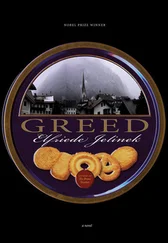Aaaaah, comes a noise from next door, for a change, a variation on the same theme, though it introduces nothing new. Rainer goes on practising keeping his face impassive despite his hatred and his hand relaxed despite extreme aggression and his mouth unstrained despite his greed and anger.
Eeeeeh, rollicks Anna, yet another orgasm, who knows however many that is now, amazing. Tonight will doubtless be another occasion for Rainer onanism, to ease the tension, but in spite of himself and in total darkness, which is where he normally leads his life anyway.
Rainer, like countless other teenagers of his generation, is an adolescent who never gets what he wants and always wants more than he can get, though perhaps he'll make it once he's a full-grown adult. His position is hopeless. That is how he himself sees it. Once, last year, he expressed the trust he placed in his gym teacher and showed him one or two of his own poems, by way of a shy approach to the confidential closeness that can prevail at times between two human beings. But plainly the gym teacher entertained the whole staffroom with these paltry and (granted) as yet none too skilful works, guffawing the while, because other teachers often teased the young creator by quoting single lines of poetry at random, out of context.
Next door Anna is screeching as if something were hurting her. But no doubt this is indicative of unendurable desire, which is why it sounds like pain in many ways. Hans promptly starts bawling too, to keep her company. Like two wolves howling. Bestial stuff. Not really what makes Man noble at all. I think they've finished now, there's nothing left in Hans so they'll stop now and at last turn the record over.
Impassively, Rainer gawps into the mirror, and Rainer gawps back out of the mirror equally impassively, only the other way round. Rainer is on the right side, that is to say, the side where he himself is. He is not there in anybody's place, nor does anyone want to be represented by him, not even his class, which elected someone else as class spokesman, though Witkowski campaigned furiously for the job. The reason they give is that he boasts and wants to appear better than he is and is forever saying things that are untrue. This isn't a very matey way to behave to the others, because you have to be truthful, even if it hurts, even if you might be beaten as a result. You could bear the blows with pride because you hadn't lied to escape them.
I wouldn't play with fire myself, I'd have far too many reservations, says Rainer. A lot happens in the mind, enriching a person, but nevertheless some things still have to be put into action.
In Father's pistol case, an iron case 7- 8 cm deep, 30 cm long and 15 cm wide, lies the pistol. Underneath it are nude photos of Rainer's mother, including one or two close-ups of her genitals. Father always has the key with him, on his person. In a school essay on Paul Claudel's play Le Soulier de Satin Rainer puts forward the fundamental view that remorse affords no protection from punishment, and freedom can only be achieved through punishment.
Anna and Hans are just emerging, rather dishevelled, from Anna's room, pretending it was great. You could hear it, loud, replies Rainer. His sister snuggles up to her brother with her whole body, as if she had an incestuous act in mind. But no, she hasn't, because she has just been satisfied. Hans talks about some kind of sport. Compared with this, his carry-on back then was pleasant.
The dirty dishes are stacked high in the kitchen sink, the bottom of the sink is caked in a furry, mouldy, greenish felt that was once bacon and eggs. The young adolescent often gets in his own way and unfortunately there is no way of avoiding himself. There is a lot of dust on the furniture, dust which Mother ought to have removed. But she is out. Really, one can't invite anyone here. Often the adolescent obstructs himself more than his parents do, and is in his turn considerably impeded by the conditions of his life. For instance, the two of them could fetch a duster now and clear things up.
We have to go over the plans for our crimes in detail, Rainer reminds them. Come off it, not now, not after that intense experience, breathes Hans, heavily, like an athlete, and he makes an eloquent face. You ought to screw too, you wouldn't have those thoughts any more. Though Anna may possibly be pregnant, it is Rainer who throws up, a biological curiosity of the first order. Dad and Mum will be home any moment and will find an unwanted friend in the house.
Sure enough, here comes Mum and here lollops Dad. Won't you give me a kiss, eh, a kiss for your Dad, he demands of his own darling son. The latter flushes and says no, you know why not. Well, why not? Because Auntie said not long ago that only homosexuals kiss people of the same sex. Where does the boy get things like that, when we were young we had no idea about things like that! He gets if from your sister, you heard what he said.
And the ceiling complete with the light attachment – two of its little glass cups (where the candle-shaped electric bulbs are mounted) are already broken – folds down upon Rainer and his needs. But it's not as if this put an end to the needs. They are merely locked up in a prison with no means of escape.
KOCHGASSE HAS BEEN taking Hans in for several years now, to make him forget his childhood in the country altogether. All that's left are long lines of men in working overalls, washed-out trousers or smocks, and nothing about them reminds you of green meadows and a little stream. The city has no mercy, it takes a great effort to stand out so that others notice and acknowledge you, sport helps you achieve this, you fight for your team and you may even win! The muddy paths rutted with tractor tracks, the rural animals and people, have retired to the places they belong. Kochgasse conveys an urban atmosphere, today it takes him in once again and sucks him into the correct hallway, which is functionally furnished so that workers will feel at home there and not come across anything unnecessary which might be a pleasure to behold and would perhaps encourage them to want inessentials in their own lives.
No adornment, no gables or oriels, no turrets, no stucco reliefs, those are all for the irremediably dead bourgeois. Who doesn't really exist. A down-to-earth j image to match the down-to-earth strength of Recon- j struction. Which the workers who live here have been busy at for a long time. The Poetry of Life can be supplied by doilies, family photographs, pictures of deer, and the new furniture, from which may sometimes come the unwonted sounds of a new era, always supposing the furniture in question is one of the popular new radiograms. Bought on credit. Every inmate is allowed to create his own Poetry, the architect left space clear on the walls and ceilings for this purpose, for pictures and statues. Whether aforesaid Poetry is up top, round the sides or down below is just a question of the degree of maturity of the people in question.
Hans enters and instantly hits on naked simplicity.
It has no character whatsoever. Only Mother's work impresses a stamp on it, heaps of envelopes are lying around ruining the impression. Hans is now familiar with rooms unblemished by use, where islands of furniture drift by from the depths like floating pack-ice. Sophie has a room of that kind and he has often spent time in it, always keeping Sophie from something urgent that she was just intending to do. But she is glad to have him there and give him pleasure because there is something between them and that something is maturing by the hour. It is not only her environment that makes Sophie different from the other girls he knows, however. She is so special. He'd know her among thousands. Even in working overalls it would have been love at first sight, as they say in hit songs.
Читать дальше












